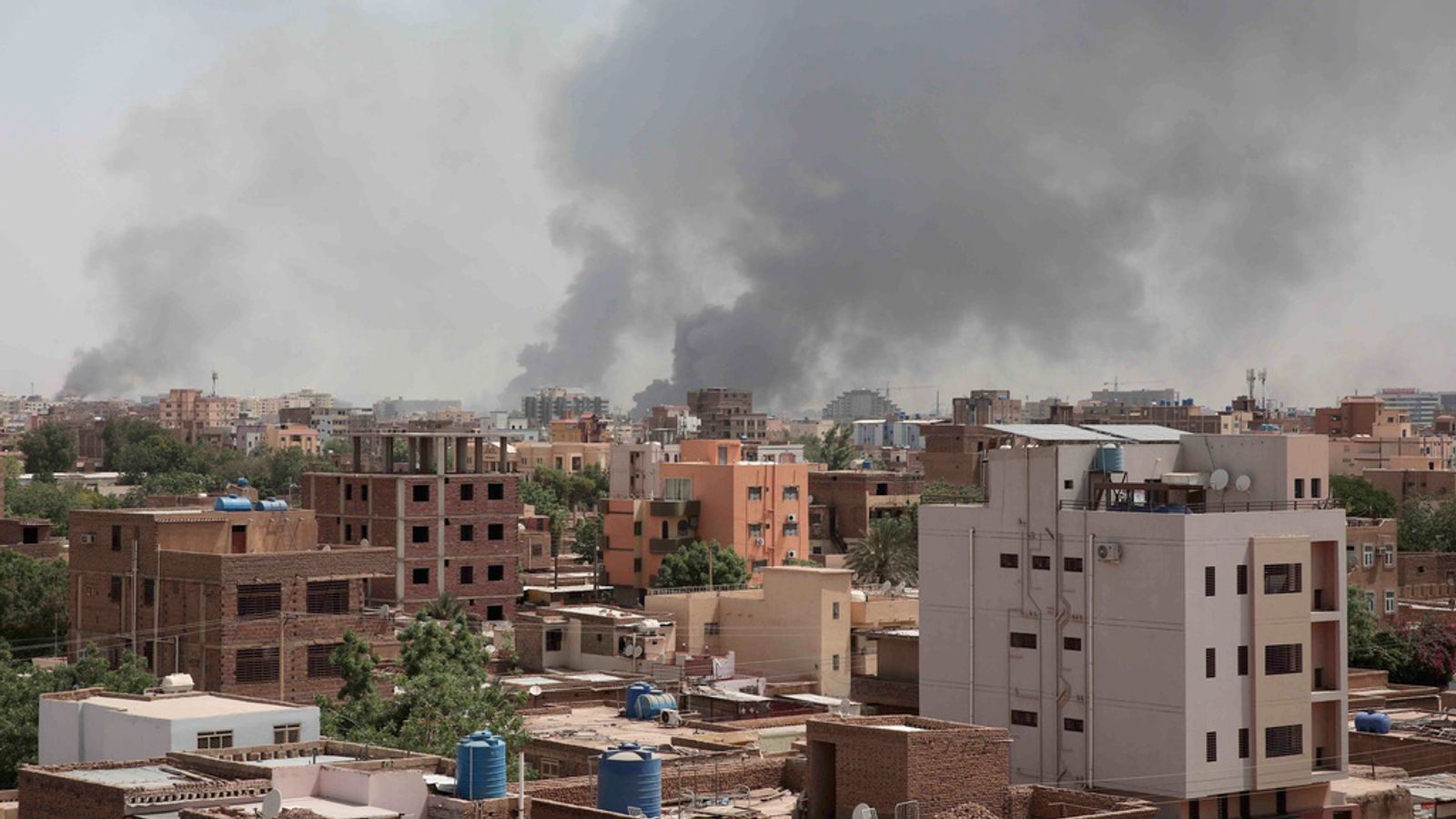Sudan: Three UN aid workers among 97 killed as crisis talks under way

Crisis mediation is under way to de-escalate the armed violence in Sudan after at least 97 people were killed and 365 injured.
Violence broke out on Saturday in the capital Khartoum and across the country as armed forces and paramilitary group Rapid Support Forces (RSF) clashed.
Three UN World Food Programme (WFP) workers were among those killed in clashes in Darfur.
Two more employees were injured while carrying out duties and a humanitarian aircraft was damaged, “seriously impacting” WFP’s work, a spokesperson said.
The programme has paused while security is reviewed as the spokesperson said there was “no excuse for targeting humanitarian workers”.
Tensions had been escalating between army head and de facto president Abdel Fattah al Burhan and RSF chief Mohamed Hamdan Dagalo, better known as Hemedti.
South Sudan President Salva Kiir and Ethiopian prime minister Abiy Ahmed have had phone calls with both leaders in an attempt to calm the violence.
Egypt and South Sudan have offered to mediate between the army and paramilitary.
Kenyan President William Ruto and Ugandan President Yoweri Museveni have also had phone calls with General al Burhan.
Why has violence erupted in Sudan?
US Secretary of State Antony Blinken has consulted with Saudi Arabian and Emirati counterparts and shared their agreement that it is “essential for all parties to immediately end hostilities”.
The two groups continued their battle for control on Sunday, signalling they were unwilling to end hostilities despite mounting diplomatic pressure.
Heavy fighting involving armoured vehicles, truck-mounted machine guns and war planes raged on Sunday in the capital of Khartoum, its sister city of Omdurman and in flashpoints across the country.
There are no heroes in this story.
Both the army and Rapid Support Forces (RSF) have been responsible for committing atrocities against civilians. Hundreds have been killed since the 2019 revolution and many more injured.
Now, the power pact that brought the two sides together to consolidate state power in the face of a pro-democracy movement has crumbled and Sudan’s citizens are once again caught in the crossfire.
Nowhere has this been felt more than in Darfur.
The RSF is made up of militias that terrorised civilians in the Darfur conflict that started in 2003 and is headed up by Mohamed Hamdan Dagalo, known as Hemedti.
During the post-revolution period, Hemedti has been de-facto vice president to his current opponent commander-in-chief Abdel Fattah al-Burhan.
Since 2020, Hemedti’s troops have been officially charged with maintaining Darfur’s security. In this time, hundreds have been killed in communal clashes and border incursions with the Central African Republic.
At least 22 civilians have been killed in the southern Darfuri city of Nyala where the RSF has full control of the airport.
Darfur Monitors told Sky News from the ground that a majority of the casualties died of internal bleeding from stray artillery as the army and RSF fought for control.
Nyala’s main hospital currently has no electricity and little capacity to help the wounded. Fighting has started in a strategic point in the city where residents are most vulnerable and hundreds more could be killed.
The death toll from Khartoum is also steadily rising. The capital is a key battleground in the fight for symbolic power and is shaken by the explosive confrontations. Here, the army is also notorious for human rights abuses and ruling the country by default.
The streets of Khartoum have been home to mass protests calling for an end to military rule and transition to civilian authority – only to be dispersed with deadly gunfire and tear gas.
International mediation has come for all sides – the UN, UK, US, EU, African Union (AU) and Intergovernmental Authority on Development (IGAD) – to transition the country into democracy but drafted power-sharing framework agreements have been signed, although not sustained.
Now, the country waits to see which side will emerge victorious and how high the price of peace will be.
Fighting was reported around military headquarters, Khartoum International Airport and state television headquarters, prompting the channel to cut transmission.
A senior military official said RSF fighters clashed with troops at military headquarters early on Sunday and that a fire broke out at a facility for ground troops.
Read more:
Why tensions in Sudan could escalate into ‘all-out civil war’
Please use Chrome browser for a more accessible video player
1:12
What’s going on in Sudan?
Former Sudanese prime minister Abdalla Hamdok said: “Peace remains the only feasible choice for the people of Sudan to avoid plunging the country into a civil war.
“We all witnessed the consequences of a civil war in many regions in Africa and in the Arab world. We must avoid that, and we can still avoid such a catastrophic situation. Therefore, I call for an immediate ceasefire and to reach an agreement, which leads to a permanent cessation (of hostilities).”
He also added other countries should not intervene in any negotiations.
Both sides signalled late on Saturday that they were unwilling to negotiate, but on Sunday a statement from the UN said General al Burhan and Hemedti agreed to a proposal for a three-hour pause in fighting (from 2pm to 5pm GMT), to allow the safe passage of humanitarian cases.
Despite the agreement, gunfire could be heard and plumes of smoke seen in the background of live broadcasts.
Hemedti previously told the satellite news network Al Arabiya that he ruled out negotiations and called on the army leader to surrender.
The military called for the RSF to be dismantled, labelling it a “rebellious militia”.